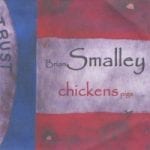Freedom Now!: A Field Notes playlist for the civil rights movement. And a question.
Greetings from the hinterlands. I suspect my long absence from this virtual community has been little missed, but for the two or three who might care please know that all is well. The challenges of helping to operate an independent bookstore and coffeeshop in this economy, while raising a child, diminish the time I might spend contemplating and writing about music. And, anyway, I’m trying to earn back my amateur status.
And yet, I still have a weekly radio show, which aired (erred) last night. I talked WMKY into two hours this month, part of the black history month celebration, mostly because once I started pulling together songs of the civil rights struggle I found the 56 minutes of one hour too limiting. Or I failed sufficiently to edit myself.
I’m going to post the playlist, or what I intended to play, which is always juggled around whilst recording when I realize I’ve totally missed the station ID break I’m supposed to leave in. I talk too much. This is a surprise to nobody.
But the real reason I’m posting the playlist is the question pulling this together raised for me. I posted this on Facebook and was roundly shouted down, and so wish to be slightly more careful how I phrase the issue. But I was struck — particularly while surfing through the Washington Square box set (though not the still-beautiful Broadsides set) that the principal concerns of the political songwriters of my distant youth (and, even, before) were not the struggle for black equality. Far more of the songs were about labor or, later, about war. (My overall theory is that most folksongs are about trying to get laid, but that’s my sense of poetry in general, and I may be jaded. Or it never worked for me, but I’d never admit that in public.)
In particular I was struck by the comparative paucity of Dylan tracks on the subject, even given his decision to walk away from topical songs early on. Now, those of you who know me know I’m not a Dylan believer. Not an aficionado. Not a fan. I respect some of it, think much of it is (to once again borrow from Pete Townsend) obscure and oblique. Defiantly, pointlessly so. That aside, though…my sense, looking backwards, is that the folk movement of the 1950s and 1960s was comparatively — underscore that word, please — less concerned with civil rights than it was with labor and other topical political issues, including various South American altercations. This is not to ignore the fact that many singers made their presence felt at demonstrations. Just that comparatively few indelible songs came from their pens on a subject which, one might have hoped, would absorb some of their creative fever.
Your mileage will vary, of course.
The playlist, then, from Grant Alden’s Field Notes, the two-hour Civil Rights episode. Limited, as always, by time and taste and what I happen to own.
“Run To Jesus,” performed by Andrew Calhoun & Campground. Apparently the song which suggested to Fredrick Douglas that he might escape to freedom.
“Sojourner’s Battle Hymn,” as sung and arranged by Sweet Honey & The Rock.
“Levee Camp and Prison Songs,” Big Bill Broonzy, Memphis Slim, and Sonny Boy Williamson, from Alan Lomax’s Blues in the Mississippi Night disc. Stories swapped about how race relations were, and a song or two half-sung. How things were.
“Black, Brown and White,” Big Bill Broonzy
“No More Auction Block,” by Paul Robeson, with his introduction from the Peace Arch concert.
“Jim Crown Train,” by Josh White
“Jim Crow Blues,” by Odetta, though it’s a comparatively recent recording
“Wade in the Water,” Dorothy Love Coates
“This Little Light of Mine,” the Swan Silvertones
“Stand By Me,” the Staple Singers
“Ninety-Nine and a Half,” Dorothy Love Coates, who wrote the song…I took it for a ride…
“Ninety-Nine and a Half (Won’t Do,” by Wilson Picket, who claimed he and Steve Cropper wrote it based on a soft drink billboard, and maybe they never heard the other…
“99 and a Half,” Mavis Staples, from the first of her comeback albums
“We’ll Never Turn Back,” the Freedom Singers
“We Shall Overcome,” Pete Seeger
“Strange Fruit,” Billie Holiday…which actually got cut for time, but this is a virtual kind of thing and it should have aired
“Mississippi Goddam,” Nina Simone
“Talking Birmingham Jam,” Phil Ochs
“Birmingham Sunday,” Richard Farina…whose work I don’t know, but apparently I should; beautiful voice
“Memphis, Tennessee,” Jim & Jesse, which allowed me to talk a little about the attempt by white supremacists to make bluegrass their especial music
“Irma Jackson,” Merle Haggard’s song, though I didn’t have his version in hand until after the show was taped, so I used Barence Whitfield’s cover from a tribute album
“Baby I’ve Been Thinking,” Janis Ian
“Blowin’ in the Wind,” the first (and perhaps only) time I’ve played Dylan on this show, and then, because one song apparently led to the other…
“A Change Is Gonna Come,” Sam Cooke, though I was shocked by the schmaltzy orchestration on this…wonder if the compilation I bought is suspect…
“I Wish I Knew (IHow It Would Feel To Be Free),” Solomon Burke
“MIghty Mighty (Spade & Whitey),” The Impressions…not the hit, but the song speaks eloquently to the ethos of the time
“Say It Loud (I’m Black and I’m Proud),” inescapable. I’ve recently finished an advance of a new biography of James Brown, who proves as entirely unknowable as any human might be
“The Revolution Will Not Be Televised,” Gil Scott-Heron, whose pieced together autobiography is also new, and…frustrating,…as is the mastering on this song…
“Burn, Burn, Burn,” Reverend F.D. Kirkpatrick
“Inner City Blues,” Marvin Gaye
exeunt




